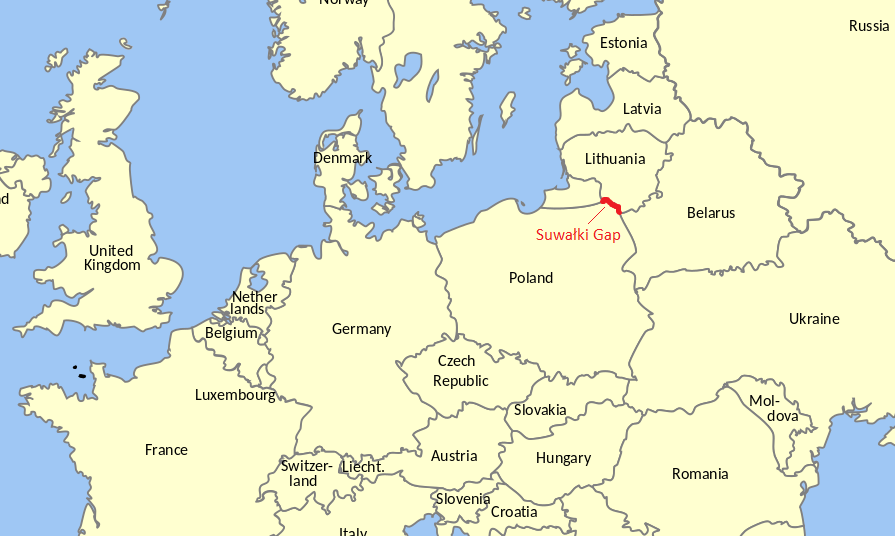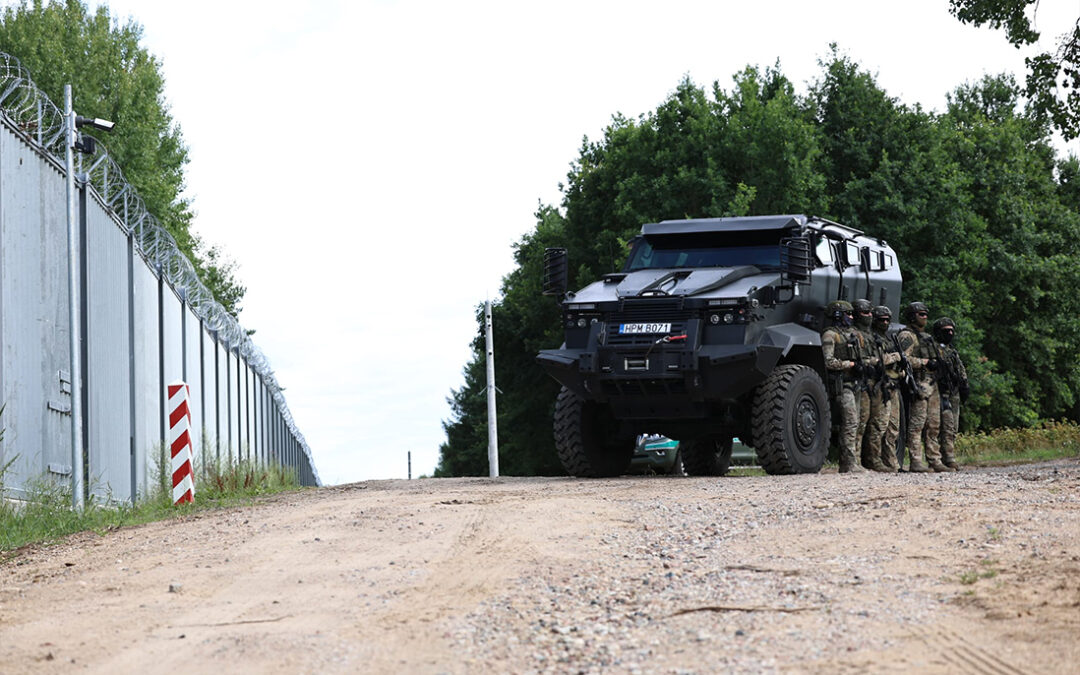Some of the Wagner mercenaries who recently relocated to Belarus have moved towards the Suwałki Gap – a strategically important choke point on the border between Poland and Lithuania – says Polish Prime Minister Mateusz Morawiecki.
He warns that fighters from the Russian private military group will be used to mount “further hybrid attacks” against Poland by helping migrants illegally cross into Polish territory and even themselves entering disguised as such migrants.

“For almost two years, we have been dealing with a permanent attack on the Polish border,” said Morawiecki today. “This year alone there have been over 16,000 attempts to cross the border illegally by immigrants, whom Lukashenko and Putin [the presidents of Belarus and Russia] are trying to push over the Polish border.”
“But now the situation is becoming even more dangerous: we have information that over 100 mercenaries from the Wagner Group have moved towards the Suwałki Gap, near Grodno in Belarus,” he added, speaking during a press conference at an arms manufacturer in Silesia.
“This is certainly a step towards a further hybrid attack on Polish territory,” said the prime minister. “They will probably be disguised as Belarusian border guards and will help illegal immigrants to get to Polish territory, to destabilise Poland.”
“But presumably, they will also try to infiltrate Poland, pretending to be illegal immigrants, they will try to pass through, penetrate, and this creates additional risks,” he warned.
Premier @MorawieckiM w Zakładach Mechanicznych „Bumar-Łabędy” w #Gliwice: Od blisko 2 lat mamy do czynienia z permanentnym atakiem na polską granicę – tylko w tym roku to było 16 tysięcy prób nielegalnego przekroczenia. Teraz sytuacja staje się jeszcze groźniejsza – ponad 100… pic.twitter.com/19rj2ntH8c
— Kancelaria Premiera (@PremierRP) July 29, 2023
Yesterday, Ukraine’s National Resistance Centre reported that 100 Wagner fighters had moved towards the Suwałki Gap with the aim of “organising provocations on the border of Belarus with Poland and Lithuania”. It noted that the mercenaries “have experience in smuggling and transporting illegal migrants”.
Lithuania’s deputy interior minister, Arnoldas Abramavičius, announced that the presence of Wagner forces could lead both his country and Poland to entirely close their borders with Belarus.
“We will not let any little green men run around here,” said Polish interior minister Mariusz Kamiński on Thursday during a visit to the border, referring to the soldiers used by Russia during its occupation of Crimea in 2014. “Such a situation will never happen. We are well organised and prepared.”
Szef @MSWiA_GOV_PL @Kaminski_M_ w Krynkach: Nie pozwolimy, żeby zielone ludziki biegały nam po granicy. Do takiej sytuacji nigdy nie dojdzie. Jesteśmy zorganizowani https://t.co/BVIbBXkJuA
— wPolityce.pl (@wPolityce_pl) July 27, 2023
The Suwałki Gap, which lies between the Russian exclave of Kaliningrad and Belarus, a close Kremlin ally, has long been seen as a potential weak point for NATO in a war with Russia. After Moscow’s invasion of Ukraine last year, some media outlets began calling it “the most dangerous place on earth”.
Since the start of Russia’s war in Ukraine, Poland has strengthened security along its borders with both Kaliningrad and Belarus.
In the latter case, it had started to do so even earlier, after Belarus began orchestrating a crisis in mid-2021 that has seen thousands of migrants and asylum seekers – mainly from the Middle East, Asia and Africa – try to cross into the EU.
A group of Syrian and Iraqi asylum seekers – many of them children – are “trapped” on the Polish-Belarusian border, having faced violence in Belarus but unable to enter Poland, according to activists.
Poland’s human rights office has visited the group https://t.co/S0b9NqxEbd
— Notes from Poland 🇵🇱 (@notesfrompoland) May 29, 2023
After Minsk offered sanctuary to Wagner fighters and their leader Yevgeny Prigozhin following their short-lived rebellion in June, Poland responded by sending additional forces to the border with Belarus.
Earlier this month, Wagner mercenaries began holding training exercises with Belarusian special forces near the border, though Warsaw said at the time that there was no reason to “panic”.
However, in further remarks today at a “family picnic” organised by the government, Morawiecki warned that “Wagner’s troops are ruthless criminals, often recruited from prisons”.
“They are ruthless killers, as they have shown in Africa, in the Middle East, in Ukraine,” he continued, quoted by news service 300Polityka. “Now they are on the borders of Poland.”
Wagner mercenaries who recently arrived in Belarus are holding training exercises this week with Belarusian special forces near the border with Poland.
Warsaw says it is monitoring the situation but that there is no need for “panic” https://t.co/4Ab1Vcdpd2
— Notes from Poland 🇵🇱 (@notesfrompoland) July 20, 2023
“Imagine, for a moment, that PO [the main opposition party] had somehow won the 2019 elections,” said the prime minister. That would mean Poland having an “unguarded border” and PO leader Donald “Tusk waiting for instructions from Berlin on what to do”.
By contrast, the current Law and Justice (PiS) government is “defending the whole border with determination precisely so that illegal immigrants do not flood Poland”, added Morawiecki.
Recent weeks have seen PiS and PO clash over the issue of migration amid campaigning for this autumn’s parliamentary elections. Each has accused the other of supporting policies to allow large numbers of Muslim migrants into the country.
During his remarks today at the arms manufacturer, Morawiecki also accused Tusk of being too friendly towards Russia and Germany during his time as prime minister. The PO leader is “a very dangerous man”, said Morawiecki, quoted by the Polish Press Agency (PAP).

Notes from Poland is run by a small editorial team and published by an independent, non-profit foundation that is funded through donations from our readers. We cannot do what we do without your support.
Main image credit: MSWiA (under CC BY-NC-ND 3.0 PL)

Daniel Tilles is editor-in-chief of Notes from Poland. He has written on Polish affairs for a wide range of publications, including Foreign Policy, POLITICO Europe, EUobserver and Dziennik Gazeta Prawna.



















